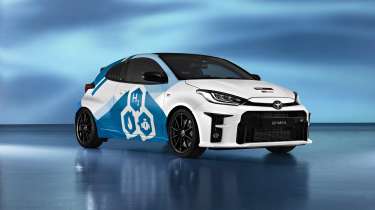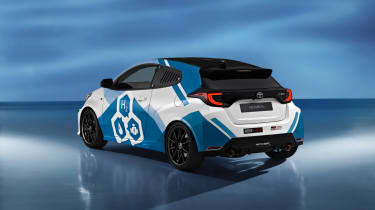Hydrogen-powered Toyota GR Yaris concept revealed
The combustion-powered Toyota GR Yaris has been fitted with a hydrogen fuel system in this latest concept car
While many of us will be familiar with electricity-generating hydrogen fuel cells as a route to lower emissions vehicles, the fact that hydrogen can be burnt in combustion engines usually gets less attention. This technology theoretically has the potential to combine zero carbon tailpipe emissions with the desirable performance characteristics of a petrol engine, and Toyota is exploring it with this new GR Yaris concept.
In order to run the GR Yaris on liquid hydrogen, few of the car’s internals have had to be modified. The concept uses the same G16E-GTE turbocharged 1.6-litre three-cylinder engine, six-speed manual transmission and clever all-wheel drive system as the petrol version. The changes that have been made only focus around the fuelling system, swapping the standard fuel tank for a highly-insulated pressurised tank and modifying the fuel rails and injectors to suit.
As liquid hydrogen burns faster than normal petrol, the engine’s responsiveness is largely unaffected but carbon dioxide emissions are almost completely eliminated.
So is this a win-win, right? Well not exactly. Hydrogen combustion technology hasn’t been widely adopted by all manufacturers for a variety of reasons, starting with the fact that while it’s light on carbon, it still produces nitrous oxide (NOx) at relatively high levels.
Hydrogen fuel consumption is also higher than with basic petrol. This means that you need a lot more to go the same distance and this issue is compounded by the energy intensive process for creating liquid hydrogen in the first place. The risk is that the technology merely displaces carbon emissions from the tail-pipe to the production process before it reaches the car, but major strides have been made in cleaning up hydrogen production and Toyota would appear to be taking an interest if the GR Yaris concept car is an indicator.
The dream scenario of fixing all of the combustion engine’s problems with a simple switch to hydrogen doesn’t seem to work out, yet. But that’s not to say the current flaws in the technology won’t one day be solved.








